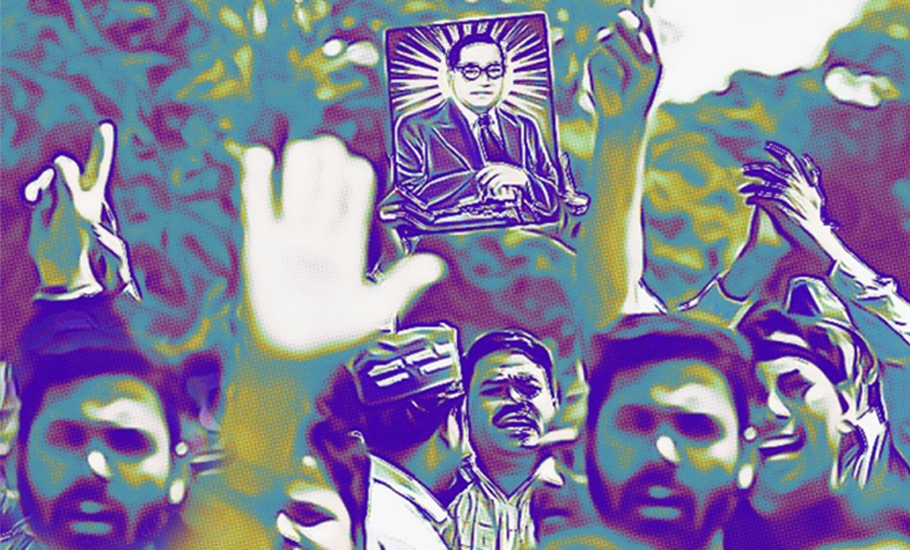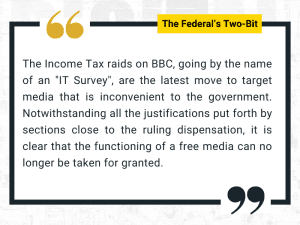
BBC may be govt’s target, but IT ‘survey’ signals tough days for India’s democracy

Less than a month after the BBC aired a critical documentary, The Modi Question, it received an unexpectedly strong answer in the form of a visit by India’s Income Tax officials. Though there cannot be a stone-etched evidence to link the documentary with the IT ‘Survey’ on the global broadcaster’s offices in the country, connection between the two is a circumstantial no-brainer.
The BBC is not just any desi television channel that can be easily intimidated. It is journalism’s hallowed institution – pioneering, path-breaking and THE mentor to the world’s liberal and free media. The London-headquartered channel has experienced worse reactions from governments around the world – including being banned and its journalists jailed and killed — all for its searing stories. Almost always, it has emerged unscathed. So, one is not worried about the BBC, it can douse the India “storm in its teacup” with aplomb.

However, as with everything else in the world, the BBC is not perfect. It has its warts in the form of angularities and biases, even below-par reporting at times, besides being at the centre of organisational controversies. The worry, really, is what the action against BBC means for India and its already shrinking democratic space, an inalienable prerequisite for a free media.
Diabolical twist
Bring up this question, and you are always confronted by a counter from a BJP supporter – “what happened during the Emergency?” An effective “whataboutry” that always works. But let it also be said that, until now, no one, including the Congress, has ever attempted to whitewash the then Indira Gandhi government’s censorship of the press. The narrative has been kept alive, justifiably, so as to warn Indians of the terrible things that can happen when the media is stifled and truth kept hidden from people.
Also read: The India story: Polarised media, a belligerent state, and some silenced voices
In a diabolical twist, however, this precedent is now being quoted to justify the arm-twisting of the media by the government. And, pray, who are the people now in power? The very same folks who, along with many others in the then political opposition, resisted the Emergency and fought to restore Constitutionally-guaranteed freedoms and democracy.
One would have expected that the historical memory of the infamous period between June 1975-March 1977 would spur the Modi government to not only uphold democracy and media freedom but also work to strengthen them. The reverse appears to be happening. Sadly, the Emergency is being used cynically as an excuse to further weaken India’s democratic institutions, including the media.
As long as India’s Constitution is intact and parliamentary democracy continues, governments headed by various political parties will come and go – irrespective of how long they are in power. As people who have had the fortune of living in a democratic country, the stakes are clearly high as far as freedoms are concerned, including the right to freedom of expression. It doesn’t matter which political party is in power at any given time as long as the basics are not disturbed.
Successful democracies
Developed nations in Europe and countries like the United States are considered successful democracies as their basics don’t change or not tampered with by each passing government. Presidents and prime ministers are accountable to their democracies, parliaments, etc., and none can easily alter the fundamentals. Former US president Donald Trump, in a foolhardy attempt, tried to subvert the 2020 presidential election results only to be rebuffed by his own party colleagues. When British prime ministers like Theresa May, Boris Johnson and Liz Truss couldn’t deliver, their own Conservative Party colleagues disowned them, forcing their resignations.
In India’s case, its deeply feudal social mores have tended to elevate prime ministers into superhumans, who then are not easily answerable to the various institutions, including the media. Former Prime Minister Indira Gandhi, by imposing the Emergency, belittling the Constitution and negating the freedom of expression may have wanted to perpetuate her rule after the Allahabad High Court judgment in 1975. In the process, she showed it was possible to short-change the vision of India’s Constitution framers and dilute the structures that make up the country’s democracy.
Also read: SC dismisses plea seeking complete ban on BBC from operating in India
Though the succeeding Janata Party government did overturn some of the legislations and made it difficult for any succeeding prime minister to impose a similar Emergency, what the current situation shows is there are other ways to dilute India’s democracy.
The fall in India’s global ranking on various freedom indices is but one indication. India being variously described as “partially free”, an “electoral autocracy”, etc, is another disturbing perception based on a variety of factors.
The slide
While these perceptions and rankings can be contested, events on the ground appear to support the democratic slide. For instance, it is today entirely possible that journalists doing their jobs can be arrested on some ground or the other – and then sent off to prison a la Siddique Kappan who was in jail for around 800 days. If he had just decided to keep away from reporting on Uttar Pradesh’s Hathras rape case, he would not have experienced incarceration.
While instances like these have been well-documented — and there is still a lingering hope that the government will only go thus far and no further — they indicate that the Indian state as a liberal, secular parliamentary democracy is not something that people can take for granted.
The current active generation was born, bred and exposed to life in a democratic India. None has experienced dictatorship or authoritarianism of any kind (except for the Emergency nearly 50 years ago). So, it is easy to forget or not know what it means to lose our freedoms. A look at other parts of the world could provide a clue. The Arab uprising a decade ago, that saw thousands killed, governments being thrown out and economies collapsing, was nothing but the yearning of common people for basic freedoms that a country like India already enjoys.
Admiration and envy
It is not for nothing that the world admires India, which, for the last seven decades has managed, despite setbacks, to function as a democracy. The envy it kindles among those struggling to find their voices elsewhere is entirely understandable.
Also read: Vajpayee’s spirit needed now to navigate democracy
So, when governments in India, like the current dispensation, take it upon themselves to arrogate total power to themselves with scant regard for democratic conventions and through legislative attempt to stifle freedom of expression, they end up setting precedents that succeeding governments can potentially use to further weaken the structures that keep the country aloft as a democracy.
The losers eventually are common people like us, while the winners are vested interests within India and outside who would like to see this great democracy humbled.
(The Federal seeks to present views and opinions from all sides of the spectrum. The information, ideas or opinions in the articles are of the author and do not necessarily reflect the views of The Federal)


